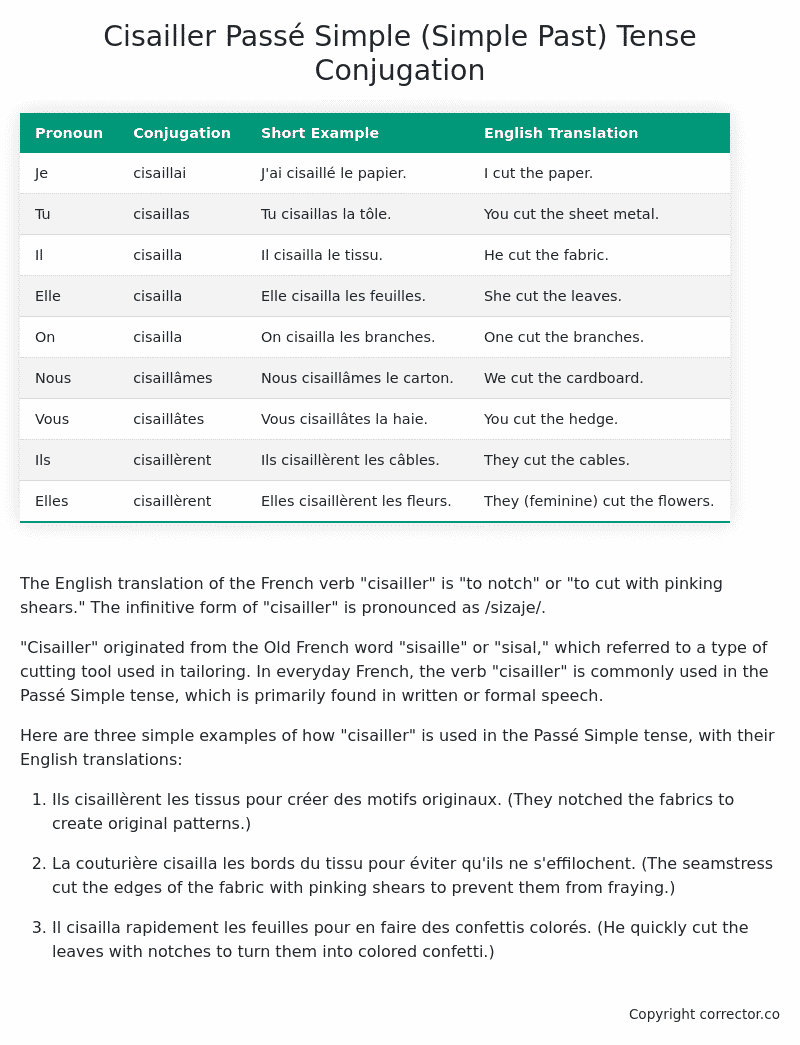Passé Simple (Simple Past) Tense Conjugation of the French Verb cisailler
Introduction to the verb cisailler
The English translation of the French verb “cisailler” is “to notch” or “to cut with pinking shears.” The infinitive form of “cisailler” is pronounced as /sizaje/.
“Cisailler” originated from the Old French word “sisaille” or “sisal,” which referred to a type of cutting tool used in tailoring. In everyday French, the verb “cisailler” is commonly used in the Passé Simple tense, which is primarily found in written or formal speech.
Here are three simple examples of how “cisailler” is used in the Passé Simple tense, with their English translations:
-
Ils cisaillèrent les tissus pour créer des motifs originaux.
(They notched the fabrics to create original patterns.) -
La couturière cisailla les bords du tissu pour éviter qu’ils ne s’effilochent.
(The seamstress cut the edges of the fabric with pinking shears to prevent them from fraying.) -
Il cisailla rapidement les feuilles pour en faire des confettis colorés.
(He quickly cut the leaves with notches to turn them into colored confetti.)
Table of the Passé Simple (Simple Past) Tense Conjugation of cisailler
| Pronoun | Conjugation | Short Example | English Translation |
|---|---|---|---|
| Je | cisaillai | J’ai cisaillé le papier. | I cut the paper. |
| Tu | cisaillas | Tu cisaillas la tôle. | You cut the sheet metal. |
| Il | cisailla | Il cisailla le tissu. | He cut the fabric. |
| Elle | cisailla | Elle cisailla les feuilles. | She cut the leaves. |
| On | cisailla | On cisailla les branches. | One cut the branches. |
| Nous | cisaillâmes | Nous cisaillâmes le carton. | We cut the cardboard. |
| Vous | cisaillâtes | Vous cisaillâtes la haie. | You cut the hedge. |
| Ils | cisaillèrent | Ils cisaillèrent les câbles. | They cut the cables. |
| Elles | cisaillèrent | Elles cisaillèrent les fleurs. | They (feminine) cut the flowers. |
Other Conjugations for Cisailler.
Le Present (Present Tense) Conjugation of the French Verb cisailler
Imparfait (Imperfect) Tense Conjugation of the French Verb cisailler
Passé Simple (Simple Past) Tense Conjugation of the French Verb cisailler (You’re reading it right now!)
Passé Composé (Present Perfect) Tense Conjugation of the French Verb cisailler
Futur Simple (Simple Future) Tense Conjugation of the French Verb cisailler
Futur Proche (Near Future) Tense Conjugation of the French Verb cisailler
Plus-que-parfait (Pluperfect) Tense Conjugation of the French Verb cisailler
Passé Antérieur (Past Anterior) Tense Conjugation of the French Verb cisailler
Futur Antérieur (Future Anterior) Tense Conjugation of the French Verb cisailler
Subjonctif Présent (Subjunctive Present) Tense Conjugation of the French Verb cisailler
Subjonctif Passé (Subjunctive Past) Tense Conjugation of the French Verb cisailler
Subjonctif Imparfait (Subjunctive Imperfect) Tense Conjugation of the French Verb cisailler
Subjonctif Plus-que-parfait (Subjunctive Pluperfect) Tense Conjugation of the French Verb cisailler
Conditionnel Présent (Conditional Present) Tense Conjugation of the French Verb cisailler
Conditionnel Passé (Conditional Past) Tense Conjugation of the French Verb cisailler
Conditionnel Passé II (Conditional Past II) Tense Conjugation of the French Verb cisailler
L’impératif Présent (Imperative Present) Tense Conjugation of the French Verb cisailler
L’impératif Passé (Imperative Past) Tense Conjugation of the French Verb cisailler
L’infinitif Présent (Infinitive Present) Tense Conjugation of the French Verb cisailler
L’infinitif Passé (Infinitive Past) Tense Conjugation of the French Verb cisailler
Le Participe Présent (Present Participle) Tense Conjugation of the French Verb cisailler
Le Participe Passé (Past Participle) Tense Conjugation of the French Verb cisailler
Struggling with French verbs or the language in general? Why not use our free French Grammar Checker – no registration required!
Get a FREE Download Study Sheet of this Conjugation 🔥
Simply right click the image below, click “save image” and get your free reference for the cisailler Passé Simple tense conjugation!

Cisailler – About the French Passé Simple (Simple Past) Tense
Formation
Usage
Narration
Historical Context
Interactions with other tenses
Passé Composé
Imparfait
Conditional and Subjunctive
Summary
I hope you enjoyed this article on the verb cisailler. Still in a learning mood? Check out another TOTALLY random French verb conjugation!


